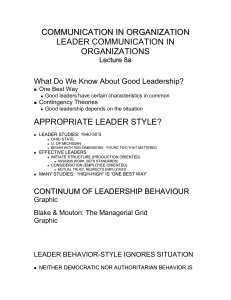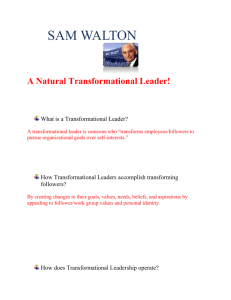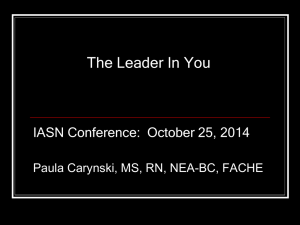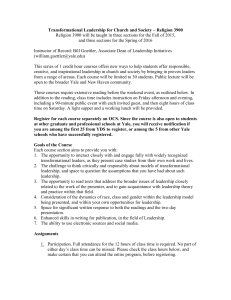LLP-2.14 Transformational Leadership
advertisement
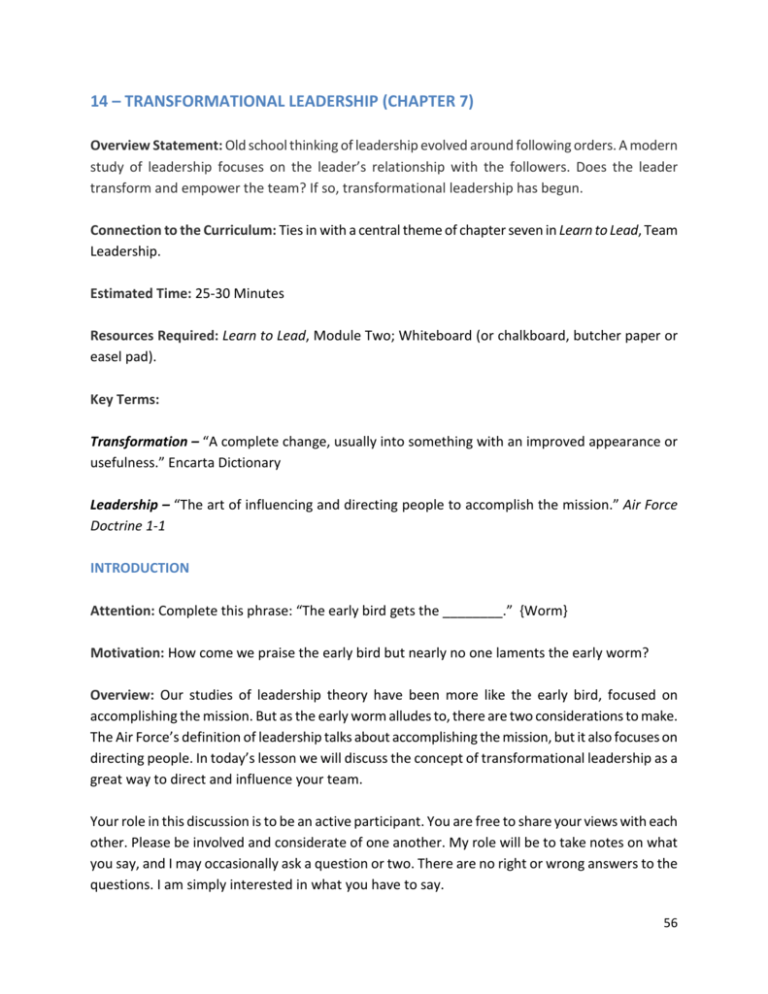
14 – TRANSFORMATIONAL LEADERSHIP (CHAPTER 7)
Overview Statement: Old school thinking of leadership evolved around following orders. A modern
study of leadership focuses on the leader’s relationship with the followers. Does the leader
transform and empower the team? If so, transformational leadership has begun.
Connection to the Curriculum: Ties in with a central theme of chapter seven in Learn to Lead, Team
Leadership.
Estimated Time: 25-30 Minutes
Resources Required: Learn to Lead, Module Two; Whiteboard (or chalkboard, butcher paper or
easel pad).
Key Terms:
Transformation – “A complete change, usually into something with an improved appearance or
usefulness.” Encarta Dictionary
Leadership – “The art of influencing and directing people to accomplish the mission.” Air Force
Doctrine 1-1
INTRODUCTION
Attention: Complete this phrase: “The early bird gets the ________.” {Worm}
Motivation: How come we praise the early bird but nearly no one laments the early worm?
Overview: Our studies of leadership theory have been more like the early bird, focused on
accomplishing the mission. But as the early worm alludes to, there are two considerations to make.
The Air Force’s definition of leadership talks about accomplishing the mission, but it also focuses on
directing people. In today’s lesson we will discuss the concept of transformational leadership as a
great way to direct and influence your team.
Your role in this discussion is to be an active participant. You are free to share your views with each
other. Please be involved and considerate of one another. My role will be to take notes on what
you say, and I may occasionally ask a question or two. There are no right or wrong answers to the
questions. I am simply interested in what you have to say.
56
MAIN POINT: TRANSFORMATIONAL LEADERSHIP IS PEOPLE FOCUSED
A leader’s approach to leadership is likely to have a direct impact on his or her power. In other
words, the leader’s effectiveness with transformational leadership will dictate how much ability the
leader enjoys to influence change.
Transformational leadership was developed in the 1970s by James McGregor Burns.
Transformational leaders are able to raise their followers to a new level. In transformational
leadership, leaders strive to help followers reach their full potential. Through inspiration and
participation, the leader's appeal compels others to not only follow, but to follow well.
There are four major leadership factors in the transformational model.
{Write the following on the board:}
Idealized
Influence
Inspirational
Motivation
Intellectual
Stimulation
Individualized
Consideration
Review:
Idealized Influence ~ Leaders are effective role models for followers. They inspire followers so
much that followers want to be like them. It's about being energetic and having a commanding
presence. According to Northouse, leaders who practice idealized influence often display high
levels of moral and ethical conduct and can be trusted to do “the right thing.”
•
Question: Think of a leader who is inspirational to you. In what ways did this leader inspire?
{Write the answers on the board.}
•
Question: Why does a leader’s influence suffer when their ethical conduct is lacking?
Inspirational Motivation ~ Leaders communicate high expectations to followers, inspiring them to
become committed to and a part of the shared vision in an organization. Inspirational motivation
promotes team spirit, which can lead to great teamwork and success.
•
Question: How can a leader motivate his or her team? {Write the answers on the board.}
57
•
Question: Is it enough to lead others with an inspiring speech? Defend your answer.
Intellectual Stimulation ~ Leaders encourage teams to think differently. Such leaders have the
ability to look at things in creative ways. Teams are encouraged to challenge assumptions, even
their own. Followers are given the latitude to figure things out by themselves while solving
problems carefully.
•
Question: Describe a time when the team came up with a great solution. Why did the team
succeed? {Write the answers on the board.}
•
Question: Why is it hard for some leaders to give up control?
Individualized Consideration ~ Leaders pay attention to the individuals on the team and help each
to become better. Such leaders are supportive and listen closely to individual needs. This type of
leader cares for each follower in a unique way that is appropriate to the individual's situation.
Because everyone is different, everyone brings their unique talents to the team. The
transformational leader knows how to tap into these differences to create the best possible
outcome.
•
Question: Think about a person who successfully challenged you to excel. How did this
person do that? {Write the answers on the board.}
•
Question: Can a team be successful if one or more individuals are not operating at their full
potential? Defend your answer. How would you encourage such team members?
CONCLUSION
Summary: Transformational leadership is powerful. You can work to change your followers,
improve their confidence and skills, and make a huge difference in their lives. I encourage you to
research “Transformational Leadership” on your own to gain further insights and practical skills.
Remotivation: Small team leadership is not about you, it’s all about your team.
Closure: Lead well!
58
SUGGESTED ACTIVITIES
Note to the instructor: Every informal discussion should be followed by one or more hands-on
activities that reinforce one or more of the concepts being discussed. These activities should last
25-30 minutes, giving about one hour total block of time for the leadership session at a typical CAP
meeting (25-30 minutes for the informal discussion, plus 25-30 minutes for the activities).
Along with any questions found in the activities themselves, you should be sure to ask, “How does
this activity tie in with our discussion?”
CAP recommends activities from the Learn to Lead Activity Guide by Rob Smith (published by the
Civil Air Patrol). You are free to substitute another activity, or create your own, as long as you tie in
with one or more concepts of the informal discussion.
Main concepts for this lesson: Empowerment; teams; affecting change.
59
